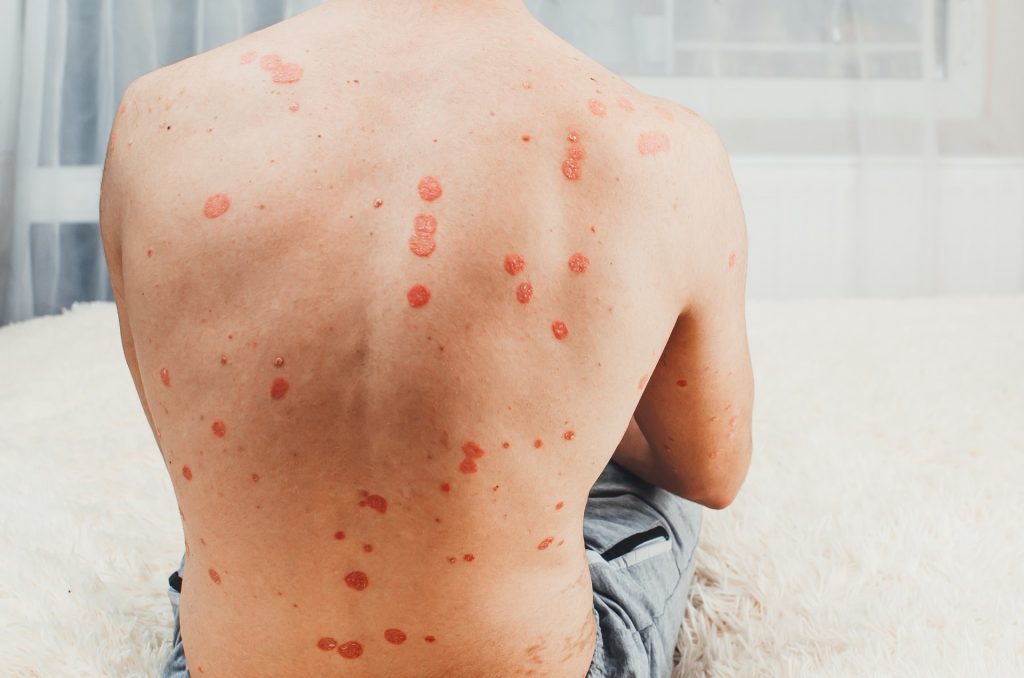Managing Psoriasis Over the Warm, Summer Months

Summer is fast approaching, and temperatures are heating up. In the south, humid weather makes 80 degrees feel like a wet 100. Desert states feel like 100 degrees because it is at least that hot! Whether excessive heat or dryness, extreme temperatures are no friend to our skin, so finding an effective skincare routine to treat any skin concerns will make summer events more enjoyable. When dealing with psoriasis conditions, the summer months can be exceptionally brutal.
What Causes Psoriasis?
The skin condition psoriasis is caused when the body is overactive in creating new skin cells. Although there are multiple reasons people experience psoriasis, it is most widely attributed to a weakened immune system. The deepest layer of skin is where the body produces new skin cells. The buildup of excessive new skin cells results in the skin
‘s surface being raised in the form of bumps, scales, and areas of discoloration.
Psoriasis symptoms may flare up and go away independently, but treatments must often be done to manage flareups or recurring symptoms. Licensed dermatologists are the most qualified to properly diagnose this skin condition and effectively treat psoriasis on all skin types. Working with an excellent dermatologist will be the shortest route to healed skin, less disruptive flareups, and a more confident summer wardrobe.
Symptoms of Psoriasis
How severe the symptoms are and how long they last are significant factors. Some experiencing symptoms of psoriasis seek over-the-counter treatments and find enough relief that they do not seek out professional help. However, many people seek a dermatologist who can help provide tangible, sustainable, and affordable solutions. Some psoriasis conditions can be severe and cause pain and discomfort. Other cases may result in varying pigmentation on the skin’s surface, creating spots. Treatment is not as urgent as those experiencing severe symptoms and flareups in milder cases.
Psoriasis will appear as irritation on the skin. As previously mentioned, multiple factors go into how it ultimately appears on the skin’s surface. In extreme circumstances, psoriasis can be painful, itchy, and may get infected if not treated. Furthermore, the appearance of psoriasis can make people self-conscious and force people to hide the condition. As summer rolls around, temperatures are rising, and not having to hide behind long sleeves or pants all summer may be more accessible than one might think. Seeking professional advice and treatment options from a reputable dermatologist can take the dread out of the next few months.
Psoriasis does not discriminate. It is an unwelcomed skin condition that affects all skin tones. Experienced dermatologists specializing in darker skin tones have effective treatments that work, and they do differ from those preferred for the treatment of lighter skin tones. Most over-the-counter products can’t distinguish between skin types and tones as far as topical treatments.
Dermatologists Offer Affordable Solutions
It is not much help when there are solutions for those dealing with the symptoms of psoriasis, but there are not affordable. Today, many experienced and reputable dermatologists have many years in the field and understand how important it is to offer dermatology services to a broader community. When seeking a local dermatologist, find one that can work within your budget and take the time to help you find a solution that works on all levels.
Lighter v Darker Skin Tones
Psoriasis may look very different on different skin tones. The intensity and level of psoriasis is the most significant factor, but the same condition can appear significantly different on dark skin than on lighter skin. It is because black skin has a higher melanin content than white skin, which changes the coloration and overall appearance of the patches on different skin. Psoriasis appears as red patches with scales on light-skinned patients, whereas most dermatology patients with dark skin experience purple patches with scales of grayer coloration. Some research suggests the higher melanin of darker skin may cause the symptoms to be more widespread on black skin and that it can easily be misdiagnosed as other skin conditions. It is especially true when people are self-diagnosing with the help of the expansive, and not always helpful, opinions and medical diagnosis sites on the internet. It is always best to seek a professional dermatologist who can skip the unnecessary steps and get to the solution quickly and pointedly.
Skincare Treatments
Treatments vary, from topical creams to medicated treatments, and in certain situations, internal medicine is recommended, and only a licensed dermatologist or a medical doctor can do this. However, medical doctors do not specialize in skincare. Some internal medications may cause allergic reactions, so an excellent dermatologist will meet with you and ask questions about your history and address possible environmental factors that could potentially be affecting your condition. There are multiple treatments available and going to a professional can get the results you want to address your psoriasis and embrace all the summer months have to offer.
